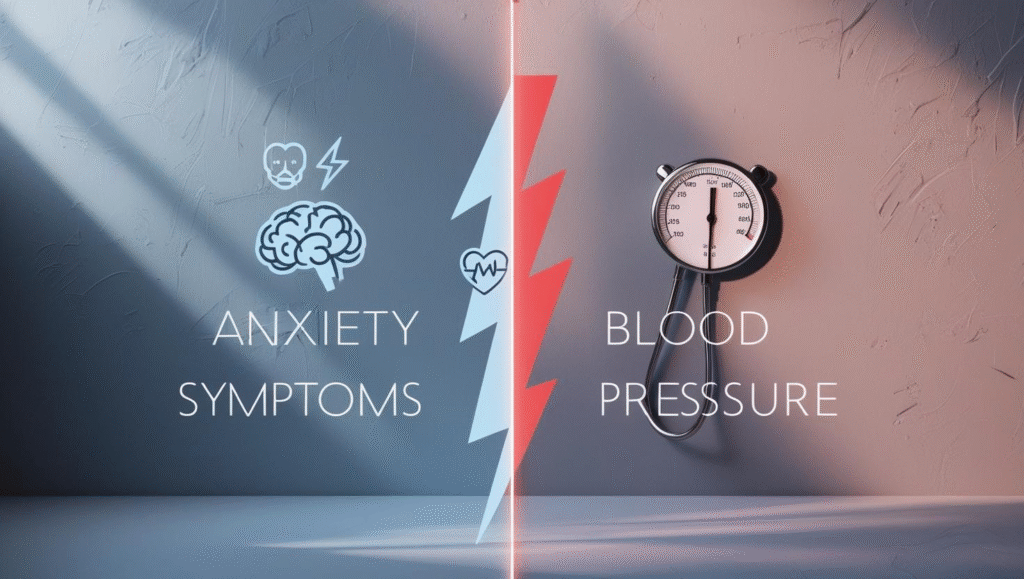
Spoiler: Yes, anxiety can cause temporary spikes in blood pressure. But there’s more to it than just a quick spike. Let’s dive into how anxiety affects your blood pressure and what you can do about it.
Table of Contents
- Understanding Anxiety and Blood Pressure
- The Fight-or-Flight Response
- Short-Term vs. Long-Term Effects
- Recognizing the Signs
- Managing Anxiety-Induced Blood Pressure Spikes
- Final Thoughts
- Resources and Support
Understanding Anxiety and Blood Pressure
Anxiety isn’t just something that messes with your thoughts—it has physical effects too. When you feel anxious, your body releases stress hormones like adrenaline and cortisol, which temporarily raise your blood pressure. This response is part of the body’s natural “fight-or-flight” system, designed to help you face a threat or escape from danger.
The Fight-or-Flight Response
When you experience anxiety, your body goes into high gear, preparing you to either fight the threat or run from it. This leads to:
- Increased heart rate
- Narrowing of blood vessels
- Release of stress hormones
While this biological reaction can be helpful in emergencies, ongoing anxiety can keep your body in a perpetual “fight-or-flight” mode, which isn’t great for your long-term health.
Short-Term vs. Long-Term Effects
- Short-Term: Anxiety-induced spikes in blood pressure are usually temporary. Once your anxiety subsides, so does the elevated pressure.
- Long-Term: Chronic anxiety, however, can lead to sustained high blood pressure, which increases your risk of heart disease and other health complications. According to the Mayo Clinic, frequent anxiety-induced blood pressure spikes can cause damage over time, similar to the effects of long-term hypertension.
Recognizing the Signs
It’s important to recognize the difference between a temporary anxiety spike and chronic high blood pressure. If you’re experiencing symptoms like:
- Rapid heartbeat
- Shortness of breath
- Dizziness
- Chest discomfort
These may be signs of anxiety-related blood pressure spikes. If you notice these symptoms regularly, it’s a good idea to check in with a healthcare professional to rule out any underlying conditions.
Managing Anxiety-Induced Blood Pressure Spikes
Here are some practical ways to help manage anxiety and prevent those sudden blood pressure increases:
1. Practice Relaxation Techniques
Deep breathing, meditation, and progressive muscle relaxation can help reduce stress and lower blood pressure. These practices are simple but effective tools in calming the body and mind.
2. Engage in Regular Physical Activity
Exercise is one of the best ways to reduce both anxiety and blood pressure. Even a daily walk can make a significant difference in your overall well-being.
3. Limit Stimulants
Caffeine, nicotine, and other stimulants can ramp up your anxiety and cause a temporary rise in blood pressure. Try reducing your intake to see if it makes a difference.
4. Seek Professional Help
If anxiety is affecting your health, talking to a therapist can be a game-changer. Therapy provides effective strategies for managing anxiety and, in turn, lowering the risk of high blood pressure.
Final Thoughts
While anxiety can cause temporary increases in blood pressure, it’s important to recognize the connection between your mental and physical health. By taking steps to manage anxiety, you can protect your heart and overall health in the long run.
Resources and Support
Want to dive deeper into the relationship between anxiety and blood pressure? Watch this helpful explainer video:
🎥 Can Anxiety Cause High Blood Pressure?
Managing anxiety isn’t just about feeling better emotionally—it’s about feeling better physically, too. Take small steps to reduce anxiety and protect your health. If you’re struggling, support is available, and there are effective strategies to help you manage both anxiety and blood pressure.
Note: This article is for informational purposes only and does not substitute for professional medical advice. Always consult with a healthcare provider for personalized guidance.

Leave a Reply